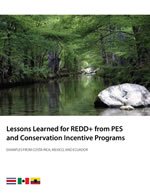Lessons Learned for REDD+ from PES and Conservation Incentive Programs
Examples from Costa Rica, Mexico, and Ecuador
By FONAFIFO, CONAFOR, Ministry of Environment, Forest Trends, Forest Carbon Partnership Facility, Latin American and Caribbean Region of the World Bank View PublicationAt the COP16 in Cancun, representatives from Costa Rica, Mexico, and Ecuador held a discussion on payments for ecosystem services (PES) and conservation incentive programs in these three countries and their relevance for national initiatives related to reducing emissions from deforestation and forest degradation, conservation, sustainable management of forests, and enhancement of forest carbon (REDD+). Building on the success of that preliminary discussion, Costa Rica, Mexico, and Ecuador are working with the World Bank and Forest Trends to document PES experiences and implications for their REDD+ programs and policies, and to make this experience internationally available for REDD+ stakeholders. This report forms a part of that work and describes lessons learned in five key areas:
- Legal aspects of PES, conservation incentives and REDD+ programs through the lens of participation agreements;
- Poverty reduction, livelihoods, and other equity issues;
- Evaluating and managing trade-offs and synergies between programs, sectors, and incentives;
- Monitoring, reporting, and verification of activities and outcomes; and
- Financial mechanisms, targeting, and controlling administrative costs.
Specifically, the report describes examples of how each of these topics has been tackled in national programs and how these experiences can inform the development of REDD+ in the three focus countries and beyond.

